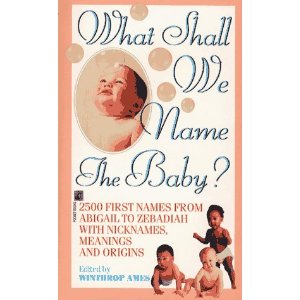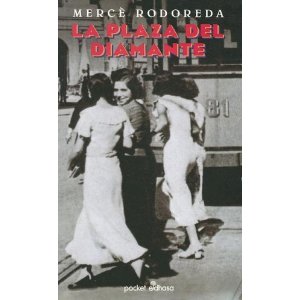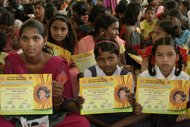
When I was a little girl someone asked me what I wanted to be when I grew up. So I sat down and made a list. High on it (below “shoe-shopper” but above bookstore clerk) was the following ambition: I wanted to be in charge of naming nail polishes and lipsticks.
At first glance that ambition seems fitting for someone who ended up working in beauty magazines–a little girl who likes both words and pretty things. But I’ve since realized that it also reveals my evil dictator side, the megalomaniac who is bent on total world domination. Because the older I become the more convinced I am that naming something is an act of power, which defines the object (say, nail polish) or person more than one might think.
When I was in college I took a Spanish literature class in which we read a book about a woman in an abusive relationship whose boyfriend was so controlling he even called her by a name that was not her own (the name he chose was Colometa, which means either pigeon or dove, depending on your point of view). I read this a long time ago (and with a shaky grasp of Spanish) but if I’m remembering correctly, a big turning point in the book occurs when she reclaims her true name, Natalia, which is, perhaps, meant to signify her rebirth. (I just did a quick google and realized that the book was La Plaza del Diamante, and is about life in Franco’s Spain, so I’m sure I just oversimplified the plot and that the abusive relationship is perhaps a stand in for the political situation, but my brain is like Mont-Saint-Michel these days–a thing of beauty if I can manage to see it through the fog, which seldom happens. Apparently, Gabriel García Marquez called this book “the most beautiful novel published in Spain after the Civil War,” so read you may want to yourselves and draw your own conclusions.)
I ended up writing a paper for that class on the power of naming, and I wish I had the antique floppy disc I saved it on, because it contained a gem of a fact I often quote but can’t quite remember the source of: most patricides are committed by “juniors”, which I extrapolated to mean that these men were so tired of living in the shadow of the father for whom they were named that they ended up killing him. Again, that’s an oversimplification and an overstatement, but I just did another quick google to see if I could locate the source of this fact, and while I couldn’t, the first few listings named these actual perpetrators of patricide: John Kewish, Jr., Ronald DaFeo, Jr. (who inspired the Amityville Horror!), Richard Jahnke, Jr., and Dail Brown Jr. So even though the source is lost to the mists of time (and the fog of baby brain), the fact seems to bear itself out.
Even earlier, when I was a freshman in high school, we came in to English class one day to find the word “hope” written on the board, and were given the assignment of writing an essay on that topic during the class period. We were supposed to do these pop essays once a year and the school was going to keep them as measures of our writing skills increasing over time, although I don’t remember ever having to write another. I do remember being so annoyed at having to expostulate on a profound if hackneyed topic in this time slot between lunch and gym that I ended up writing an essay about how “Hope” is a beautiful name but a difficult one for a woman to carry, bearing so much weight, so much expectation. “A girl named Hope can never grow up to be a stripper or a corrupt politician” I wrote. Now that I’m a parent, though, I can see the value of such a name. Is a girl named Hope less likely to get a tramp stamp on the backside I spend so much time baby-wiping clean?
Having always felt strongly about naming, I had a particularly hard time choosing a name for our baby. We needed it to be a name that sounded good in English, Greek, and Spanish. We wanted it to be strong but soft; when we considered a name we’d test it by seeing how it sounded paired with the phrase “Secretary of State”. So “Secretary of State Alexandra Baltodano arrived in DC today” sounded pretty good, whereas “Secretary of State Buffy Baltodano released a statement” didn’t have quite the elegance we desired. Amalía was a name that grew on us; it has just the right mix of buoyancy and gravitas.
Choosing a name for the protagonist of my upcoming novel, Other Waters, on the other hand, was easy. I went with Maya, which means “illusion” in Sanskrit, because, like so many of us, Maya is constantly trying to figure out which of her fears, hopes, and beliefs are real, and which are imagined.

I’ve been thinking about naming for the past couple weeks, since I received a forward from my mother, the awesome Joanie (whom I insist on calling by her name because it’s one of those that seems to fit the the person’s soul so well–she’s been Joan all her adult life but when I was a teenager a high school friend of hers visited and revealed that as a teenager she was known as Joanie, and I realized I could never call her anything else again). Said Joanie sent me an article from the Associated Press about a ceremony in Mumbai in which 285 girls changed their names from “Nakusa” or “Nakushi”, which mean “Unwanted” in Hindi, to new names of their choosing. The girls had been given the cruel name by parents or grandparents who had hoped for boys, a common state of affairs in a country where neglect of baby girls and sex-selective abortions have led to a national sex ratio of 914 girls under the age of 6 for every 1000 boys. The mass re-naming, organized by a group called “Save the Girl Child” is an attempt on the part of the state of Maharashtra to try to change the perception of girls by changing what they are called.
The article made me glad we named our daughter after a queen, and after a friend who would be a good role model for any little person. But most of all it made me proud of, and hopeful for, the girls in the story. It took two adults with advanced degrees months to pick a name for a little person they hadn’t even seen. How much harder must it have been for little girls who felt, literally, unwanted, to choose a name that could encompass all that they already were and all that they hoped to become? But it seems like they did a marvellous job. Two of the new names mentioned in the article included Vaishali–”prosperous, beautiful and good”–and Ashmita, “very tough”, which these girls already know they have to be to survive. But Natalia could have worked too, come to think of it, as this event sounds like a clear case of rebirth.